 Radio, TV, "Trust" Ratings Rise
Radio, TV, "Trust" Ratings Rise
|
 |
Audio Graphics has completed its 50th survey of internet radio listeners. This data shows how those who listen to online radio feel about social networks and where they place "trust" in a myriad of information sources available today. (The survey is conducted with support from Borrell Associates.)
The questions asked were:
- Of the time you spend online, how much is spent on the "social networks" like MySpace or FaceBook?
- How important is the time you spend on "social network" websites to your personal social life?
- Considering sources of information available to you, which one of these do you trust the most?
It is the last question's reponse that holds promise for traditional TV and Radio. Answers to the first two questions, though, show youth gently embracing social media and possibly realizing it is not the panacea all thought it was two short years ago.
Let's cover the social media aspects first. I'll dwell on the "trust" issue, and give an opinion later in these comments on why there's a shift.
Survey 50 had 1,006 respondents. It was served to 41 online radio station audiences between July 28 and October 11, 2010. To accent Survey 50 findings, we compared its answers to a similar survey taken between July and November 2008.
Here's what we found.
 |
12-44 year olds are increasing the use of social networks (surprise).
In 2008, 34.8% of respondents claimed "none" when asked, "Of the time you spend online, how much is spent on the 'social networks' like MySpace or FaceBook?" Today that figure is at 24.6%. See 2008/2010 comparisons here. |
 |
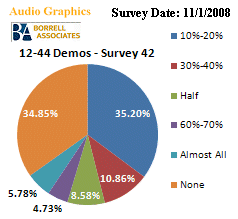 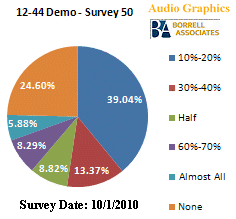
|
 |
For the question "How important is the time you spend on 'social network' websites to your personal social life?"...
12-44 year olds who answered "Not important at all" dwindled from 42.6% to 36.3%, while those reporting "Less important than other parts" rose from 34.3% to 40.3%. |
 |
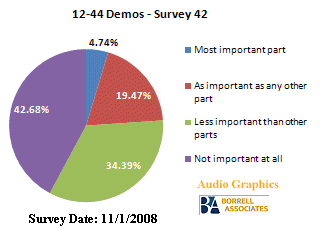 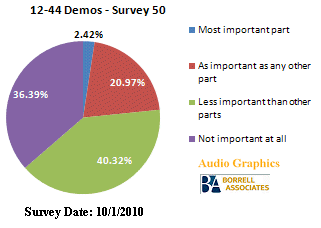
|
For the 45+ crowd answering the same question, the "Not important" group remains flat - 61.3% to 60.8% - and the "Less important" group dropped from 24.2% to 19.7%.
See 2008/2010 comparisons here.
Big Strides for TV and Radio in "Trust"
The area showing a substantial gain for traditional media came in the question "Considering sources of information available to you, which one of these do you trust the most?" In both 12-44 and 45+ age groups, Social Networks took a dramatic hit while TV and Radio shot up.
In 2008, 12-44 year olds placed the most trust in Social Networks (45.7%); at the time, TV and Radio were given the "trust" nod by only 7.3% of respondents.
Also, from the 45+ age bracket in 2008, 54.2% indicated they trusted Social Media the most as a source of information. Today from the 45* crowd, Social Media only rates 9.5% as the "most trusted."
 |
Question: "Considering sources of information available to you, which one of these do you trust the most?"
See 2008/2010 comparisons here.
|
 |
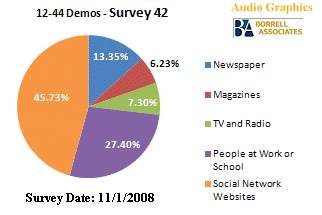 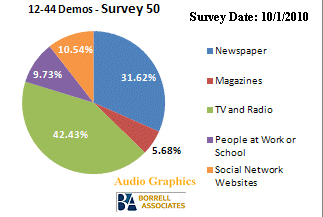
|
 |
There's a bigger swing in 45+ persons when asked, "Considering sources of information available to you, which one of these do you trust the most?" |
 |
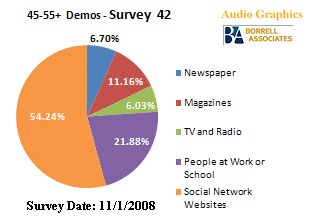 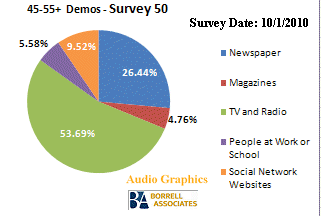
|
Why the shift? Here's an opinion: In 2008, people were coming out of the internet's early learning curve. Survey respondents were from internet radio's audience (who commonly show a higher understanding of "tech"), and they were beginning to feel competent online like the general public. Social networks were still very new - and praised with promise. Expectations were high (think buzz of podcasts in 2004).
Over the course of two years, many online actions have now become intuitive to a much larger portion of the population. Not only have the wonders of the internet been seen, but the warts of privacy invasion and advertising saturation have caused the net to lose some luster. People also now know that there is a large amount of garbage content online. Enter the familiar - TV and Radio.
A gigantic swing in trust? Yes. Though it should not be read as a sign that radio and television are maintaining their mojo.
This is only a movement in a very fluid set of mediums, wherein all can benefit by working together. If the radio industry begins offering audience and advertisers some of that online promise, in new content and accountability, the future can be bright for all.
As Audio Graphics' Survey 50 shows, trust is returning to Radio and TV. Industry executives should not let it slip away again.
Go here for Survey 50 details.

|
 |
|


 About
About


 Contact
Contact


 Indie Artists
Indie Artists


 Radio Stations
Radio Stations


 Audience Data
Audience Data


 Privacy
Privacy



|
|
 |
|
 |
 |